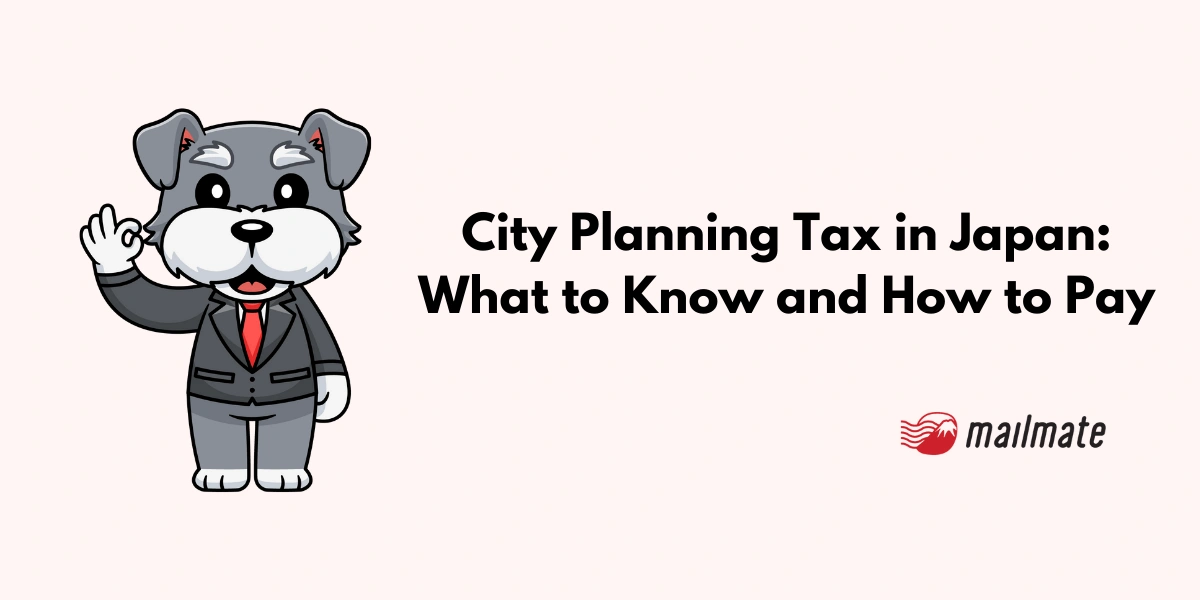City Planning Tax in Japan: What to Know and How to Pay

City planning tax in Japan is a municipal tax levied on land and buildings located within designated city planning areas. It is charged to the registered property owner as of January 1 each year and is calculated based on the property’s fixed asset value.
Each municipality decides whether to impose this tax, and the tax rate is set locally but is legally capped at 0.3%.
According to the Ministry of Internal Affairs and Communications, 642 of Japan's 1,719 municipalities require property owners to pay city planning taxes.
So, if you recently purchased a house in Japan or are about to purchase one, you should find out if your property is subject to this tax.
Today, we'll examine the city planning tax—what it is, how much it is, and how to pay it.
What is city planning tax?
City planning tax is called toshikeikauzei in Japanese (都市計画税 = としけいかくぜい), first established in 1919 (Taisho 8).
What is the legal basis of city planning tax?
City planning tax is a municipal tax established under Japan’s Local Tax Act and administered by local governments in accordance with national tax law and municipal ordinances.
While the legal framework is defined at the national level, each municipality may decide whether to levy a city planning tax and how to apply it within the limits set by law. For this reason, the existence of a city planning tax, as well as its detailed administration, may differ by municipality.
Official guidance and statistical information on city planning tax are published by the Ministry of Internal Affairs and Communications, which oversees Japan’s local taxation system.
Today, it is a tax levied by local municipalities that carry out urbanization projects.
Urbanization projects are decided on and carried out at a local level and include the following:
Urban planning facilities and projects |
Example |
|---|---|
Transportation |
Roads, urban express railways, parking lots, car terminals, etc. |
Public Facilities |
Parks, green spaces, squares, cemeteries, etc. |
Lifestyle |
Water, electricity, gas, sewerage, waste disposal facilities, etc. |
Urban development projects |
Land readjustment projects, new residential urban development projects, industrial park construction projects, urban redevelopment projects, new urban infrastructure development projects |
Source: Ministry of Internal Affairs and Communications
It is important to note that not all properties are subject to city planning tax. Properties that do not have to pay city planning tax are properties that fall outside of a city planning zone.
Who must pay city planning tax, and what property is taxed?
City planning tax is imposed on both land and buildings located within a designated city planning area.
The taxpayer is the registered owner of the property as of January 1 of the relevant tax year. If you own more than one taxable property within a city planning area, city planning tax is calculated separately for each property and billed together with fixed asset tax.
In practice:
Taxable property: Land and buildings
Location requirement: The property must be located within a designated city planning area
Taxpayer: The person or entity recorded as the property owner on January 1
If you purchase a property during the year, the seller remains the legal taxpayer for that year. However, private settlement of the tax amount between buyer and seller may be arranged at closing.
How do I find out if my property is subject to city planning tax?

There are three methods you can use to find out if your property is subject to city planning tax.
If you are working with a real estate agent, ask your real estate agent to make inquiries on your behalf.
If you are not yet working with a real estate agent, you can call the local ward office and ask whether city planning tax is levied on the area.
Use a publicly available zoning map for Japan to find out if an area has a zoning (city planning) map. Areas designated as a zoning area are subject to city planning tax. (E.g., https://toshi-keikaku.jp/.)
How much is city planning tax?
City planning tax rates vary slightly from city to city, however, it is capped at a maximum of 0.3% of the fixed asset value of the property.
Here's the calculation formula:
Fixed asset value x 0.3% = city planning tax
To learn how your property's fixed asset value is determined, please refer to this article.
Various deductions can be applied to reduce the taxable burden; but this will be automatically calculated by the local authorities and applied to your bill without needing to apply for these tax reductions.
Example: How city planning tax is applied by a municipality
For example, in Yokohama, city planning tax is imposed on land and buildings that are located within designated city planning areas of the city.
Property owners whose land or buildings fall inside those designated areas are charged city planning tax together with their fixed asset tax. The tax is calculated based on the same fixed asset valuation used for fixed asset tax, and the rate applied by the municipality is within the legal cap of 0.3%.
This means that even within the same prefecture, properties located outside Yokohama’s designated city planning areas are not subject to city planning tax, while properties inside those areas are.
Because the decision to levy city planning tax and its practical application are made at the municipal level, owners should always confirm the treatment of their specific property with the relevant local government.
How to pay city planning tax
If you own property within a city planning area on January 1st of a given year, then you will be subject to city planning tax.
This tax is then combined with your fixed asset tax and the tax notice is sent to you from the local tax office presiding over your property's jurisdiction.
Because this bill is administered at a local level, every city in Japan has a different time frame for when the bill is sent out and when it must be paid.
Having said that, in general, the tax notice is often sent out sometime in April through to the end of June.
The tax notice will include a payment slip with the option to pay the full amount all at once and 4 subsequent payment slips if you prefer to pay in 4 installments.
If you prefer to pay the bill in four installments, you should check each bill's payment due date.
If you pay all four bills at once, do so before the first bill is due.
The city planning bill will be sent to your registered property. You can pay it at your local city office, a convenience store transfer, or the post office.
For any non-resident property owners, consider using a tax representative service like MailMate, which can serve as a liaison between you and the local tax authorities.
MailMate's fluently bilingual tax representative service helps property owners stay up to date on their real estate tax bills by liaising between clients and the local government.

The service includes the following features:
Tax representative for annual real estate tax payments
Domestic point of contact for authorities (required by law)
Bill pay support for property tax payments
Tax notifications with English summaries
A virtual mailbox to receive the mail that arrives at your Japanese property
Manage important property documents and notifications in one place
Other services MailMate offers include utility and Internet setup of your Japanese property!
City planning tax vs fixed asset tax
City planning tax |
Fixed asset tax |
|
What it is |
A municipal tax used to fund urban planning and development projects |
A general municipal tax on ownership of real property |
Taxable property |
Land and buildings |
Land, buildings, and depreciable assets |
Applicable area |
Only properties located within designated city planning areas |
All taxable properties, regardless of location |
Who must pay |
The registered owner as of January 1 |
The registered owner as of January 1 |
Tax base |
Fixed asset value of the property |
Fixed asset value of the property |
Typical tax rate |
Set by each municipality, capped at 0.3% |
Standard rate is 1.4% (unless a municipality sets a different rate) |
Is it always imposed? |
No – municipalities decide whether to levy it |
Yes – imposed nationwide |
Billing method |
Billed together with fixed asset tax |
Billed annually by the municipality |
Frequently asked questions
What's the difference between city planning tax and fixed asset tax?
All properties in Japan are subject to fixed asset tax annually, but not all properties are subject to city planning tax. If your property is located within a city planning area, you will be subject to city planning tax every year. However, if your property is outside of a city planning area, you will only need to pay fixed asset tax.
What other property taxes must I pay on my Japanese property?
Other taxes besides city planning tax include stamp duty, registration and license tax, property acquisition tax, and fixed asset tax.
Is it mandatory to have a tax representative?
If you don't live in Japan but own property in Japan, you are required to appoint a tax representative. Japanese tax law mandates that non-residents with tax obligations, such as property tax, designate a tax agent to handle matters like filing tax returns and paying taxes.
Do foreign investors have to pay city planning tax in Japan?
Yes. Investors from foreign countries are subject to the same property taxes as domestic owners in Japan. If you own land or houses located within a designated city planning area, city planning tax is a tax levied on the registered owner, regardless of nationality or residence status. If you live outside Japan, you must appoint a local tax representative to receive notices and handle payment on your behalf.
Does city planning tax apply to business properties and companies?
Yes. City planning tax applies to properties used for business purposes as well. If companies own land or buildings located in a designated city planning area, those properties are subject to city planning tax in the same way as residential properties.
Can city planning tax be treated as expenses for business or investment purposes?
In many cases, yes. When a property is used for business or rental investing, city planning tax may be treated as deductible expenses for accounting and tax purposes. The exact treatment depends on how the property is used, and whether it is owned personally or by a company. Professional tax advice is recommended, especially for cross-border ownership.
In closing
City planning tax may or may not apply to your property depending on whether your property is inside of a city planning zone.
Knowing if and when your tax bill is due and how to pay it will give you peace of mind that you're complying with Japanese tax law.
For further peace of mind, consider appointing MailMate as your tax representative.
Founded in 2019, MailMate has simplified property ownership for foreigners living abroad and is an increasingly popular option recommended by users and well-known industry figures.

Additionally, if you use MailMate's tax representative service for property owners, MailMate will take care of filing the tax representative form with the relevant tax office on your behalf.
Navigate Japan's tax system with an experienced tax representative service tailored for foreign property owners!
Spending too long figuring out your Japanese mail?
Virtual mail + translation services start at 3800 per month. 30-day money-back guarantee.

